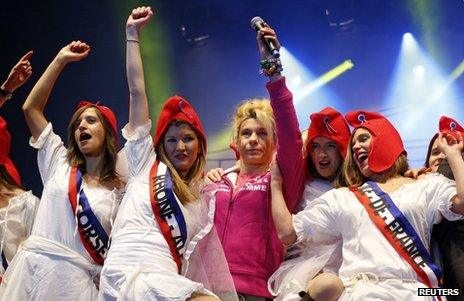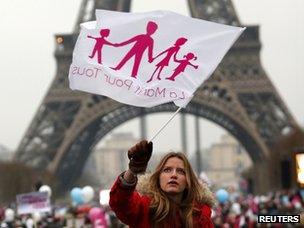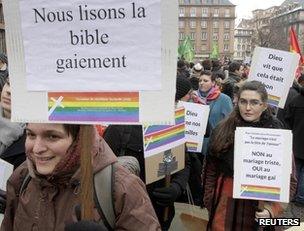France's gay marriage fight
- Published
- comments

Frigide Barjot (centre) has electrified the anti campaign
While same-sex marriage is now well established in some European countries, proposals to introduce it in France have provoked a strong backlash.
Two weeks ago, French opponents of gay marriage and adoption staged one of the biggest demonstrations of popular feeling that the country has seen in years.
Some 340,000 people, according to police, marched through central Paris to oppose a government bill that goes before the National Assembly on Tuesday.
Supporters of gay marriage have staged their own shows of strength, and believe they have public opinion on their side. This weekend some 125,000 rallied in Paris, police said.
But it is the scale of the "manif pour tous", against gay marriage and adoption, that took many outside observers by surprise.
Normally it is the political left in France that puts on these mass shows of support.
But this was unmistakeably a conservative protest, backed - in the main - by right-wing parties and the principal religions.
So what does it show?
The existence of a silent French majority, slow to act but formidable when aroused?
The latent powers of the Catholic Church to mobilise the faithful when an issue is sufficiently grave?
Provincial hostility to a metropolitan elite that dominates debate and puts an ever smoother liberal spin on issues of right and wrong?
Yes, a bit, to all of the above. But there are a couple of other factors too.
Shrewd pitch
First, the antis have run an intelligent and media-savvy campaign.
From the start they recognised the dangers of being seen as the twitching arm of reactionary homophobia.
So they have made sure they constitute a broad-based "citizens" movement, with no formal links to churches or politicians.

Observers have been surprised that so many people came out in public opposition to gay marriage
And in their spokeswoman - a performer who goes by the pseudonym Frigide Barjot - opponents of gay marriage have found a perfect antidote to charges that they are superannuated bigots.
A 50-year-old, blonde-haired extrovert who describes herself as an "anarchist of love", Barjot has become a national figure in recent weeks, with constant appearances on radio and television.
She takes care at every interview to state that her arguments are not directed at gay people, but at the proposed law, as framed.
"If what was on offer were a law that further enshrined rights for gay couples, that enriched their unions, and got rid of the discriminations and injustices that undoubtedly still exist - then I would support it," she says.
Instead - according to Barjot - what President Francois Hollande has promised is a law that will "de-structure" society by "destroying the concept in law of mother and father" and changing the time-honoured essence of the family.
Everybody affected
The other reason why gay marriage has provoked such a powerful debate in France has to do with the nature of the country's institutions.
France is practically unique in Europe in making it obligatory, for couples who marry, to do so in a civil ceremony, with potential jail terms for priests who conduct a religious ceremony first.
In other countries, priests, rabbis or imams who carry out weddings are also acting as civil officials, and the marriage conducted in church, synagogue or mosque is duly registered in law.

"We read the Bible gaily": gay marriage supporters at a march in Strasbourg
This is the case in other "Catholic" countries like Spain and Portugal, which have recently adopted gay marriage. Indeed the absence of long-lasting controversy over the issue in Spain and Portugal is often adduced as an argument by supporters of gay marriage in France.
However - as a study by the liberal French think-tank the Thomas More Foundation, external has noted - in Spain and Portugal people who oppose gay marriage can continue to get married in church, content with the feeling that "their" marriage has nothing to do with the civil one organised by the state and now open to gay people.
But in France, there can be no such separation. The civil marriage in France is compulsory, and so if there is a change in the civil code on marriage, it affects everybody.
Again, this may help explain why so many people feel so strongly about the issue.
The antis have certainly been emboldened by the success of their 13 January demonstration.
On Friday they were received at the Elysee Palace, where they restated to President Hollande their insistence that the issue be put to a referendum.
They argue that to extend full-blown marriage to gay people is to play sorcerer's apprentice with the most important building-block of society.
They say that the right to gay adoption will remove from children the fundamental right to have a father and a mother.
Manifesto pledge
The pressure has had some effect. A clause that would have legalised the use of sperm donations to enable lesbian couples to have children has been dropped - though it may be reintroduced later in a separate bill.
However for all the spring in their stride, opponents of gay marriage are also aware that their chances of blocking France's law are small at best.
One reason is that gay marriage was clearly presented in President Hollande's election manifesto last May. The French people cannot argue that it has been foisted upon them unexpectedly.
The BBC's Hugh Schofield: "The march organisers do not want to be typecast as homophobic"
And for the president - who is under pressure on the economic front for not being sufficiently left-wing - sticking to gay marriage is a useful way of burnishing his progressive credentials.
But the bigger reason why the anti movement will have difficulty building on their momentum is that gay marriage is actually supported by most of the French.
It is not a huge majority, but polls are consistent in showing that around 55-60% believe it is the right thing to do. (In comparison, only about 50% support adoption, and there is a majority against assisted births.)
Over the weekend, demonstrations took place in Paris and across France in support of the government's bill.
There the arguments in favour of gay marriage got their outing: that it is a logical expression of equality; that it is just; that there is no evidence of it leading to a breakdown in society; that children brought up by gay couples are perfectly happy; that such children already exist by the tens of thousand so need legal recognition; that heterosexual marriage is hardly sacrosanct when so many end in divorce, and when so many children are born out of wedlock.
As a young woman called Magali at Sunday's demonstration in Paris put it: "When I see the people who protest against gay marriage, I am just so disappointed for France.
"They talk about family first, but they should see that society has changed. The family today is not the same as the family yesterday. We have to rethink the whole concept of family."
Arguments that a majority of the French - and a bigger majority among the French young - would appear to agree with.
- Published13 January 2013
- Published30 November 2012
- Published3 July 2012
- Published28 January 2011